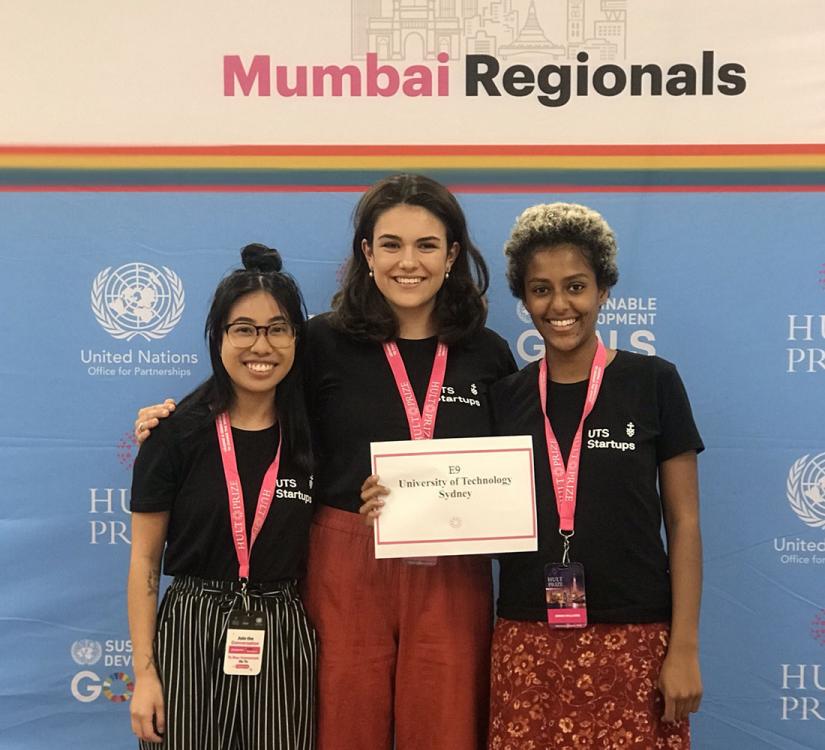One minute, they were students with a desire to make a difference and the next, they were headed to half way around the world to represent UTS on the international stage.

L to R - Merena Nguyen, Bianca Alexiou and Jemma Williams. Photo supplied.
It was a curiosity about how social justice and profit could go hand-in-hand, as well as a drive to create real-world impact, that landed six UTS students in the world’s biggest driver for the launch of for-good, for-profit startups emerging from university.
Each year, the Hult Prize competition gives students the chance to compete for US$1 million in seed funding to start up their own social enterprise.
This year marked the 10th anniversary of the competition and for those selected to participate, the goal was bigger than ever. Their mission? Generate 10,000 meaningful jobs within 10 years to address youth unemployment.
From humble beginnings
After stumbling across a poster that advertised the competition, six students from three different faculties decided to take on the challenge. Both focused on tackling some of the major issues impacting women and girls in developing countries.
For Timothy Walter (UTS Science), Bilal Kabbara (UTS Business) and Ben Lao (UTS Business/Science), it was curiosity that led them to compete in the competition.
“All three of us were intrigued by the idea of how social good and profit could go hand in hand.”
After progressing through the university-level rounds, the trio pitched Workshop, a startup targeting women’s access to basic sanitary hygiene in developing nations, whilst promoting employment among female youth. Specifically, Workshop focused on redesigning the way sanitary hygiene products are marketed and distributed in these regions.
Similar idea, different approach
Three students from the Faculty of Design, Architecture and Building (DAB), Merena Nguyen, Bianca Alexiou and Jemma Williams, decided to tackle a similar problem.
“As a team of DAB students, we were looking for an entrepreneurial experience that would take us beyond the walls of our design lab and get our hands stuck in the real world.”
Their motivation to create real-world impact led the team to form ProPeriod, which would use the production and distribution of reusable underwear to empower people through employment whilst simultaneously improving overall hygiene. Further, ProPeriod was designed to overcome the costs associated with biodegradable material for sanitary napkins and the issues around waste management.
To Tokyo and beyond
With the help of expert mentors and UTS Startups, the teams won over judges in both university-level rounds and at the Regional competition.
Workshop placed in the top two teams in their heat and had the opportunity to network with like-minded, buzzing social entrepreneurs from all corners of the world, including Africa, Bangladesh, China, England, Japan and Thailand.
After incorporating the feedback from the esteemed panel of judges (which included AT Kearney, Deloitte and Innovation NSW) ProPeriod placed in the two teams in their heat, landing them in the heart of their problem space – Mumbai, India.
For ProPeriod, the experience of competing in Regionals was inspiring and “completely surreal”.
“In particular, we were moved by the large number of local and international students who were brought together by the Hult Prize to capitalise on this opportunity to develop business models that target those who are most in need,” they said.
The opportunity to connect with like-minded students and social ventures was a key takeaway for all the UTS competitors and the students from Workshop say it’s set them on the right track for the future.
“Hult Prize at UTS has really emphasised for each of us how innovation is not just about launching a startup as an entrepreneur. Instead, more and more, innovation requires us to be an intrapreneur, disrupting the status quo of the organisations we work for, and we believe Hult Prize at UTS has prepared each of us to do just that.”
Hult Prize is leading a generation to change the world. To find out more click here.

